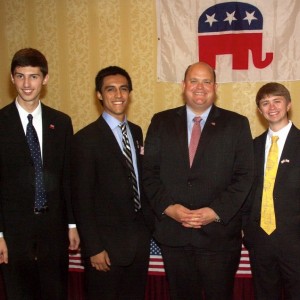
In September 2012, IC Republicans completed a study that identified the party affiliation of college faculty who are registered members of a political party in Tompkins County. We found that Democrats and Green Party members make up 92.1 percent of faculty, with only 7.9 percent of faculty covered in the study registered as Republicans and conservatives. Though this is 1.5 percent more Republicans and conservative faculty members than when the group conducted the same study in 2003, the change falls within the study’s margin of error, representing no real change. Further, the English, history, philosophy and religion, politics and sociology departments still do not have a single registered conservative, creating a very lopsided view of these fields of study.
Since 2003, Republicans at the college have pointed out the lack of intellectual diversity in programs, curriculum and guest speakers. Intellectual diversity is based on the premise that students should be free to judge each idea on its merits in the wake of theories and perspectives that cover an entire spectrum.
In the midst of an election year, the campus has shown a rather liberal view of the elections. We have yet to see a school-sponsored conservative speaker on campus in recent years and are left with a very skewed view of American politics and society. We are left with an institution where, according to the Federal Election Commision, only two of our faculty members have given money to conservative candidates. Now, we call for increased intellectual diversity in program spending, the course catalogue and theme months.
We suggest that new faculty be considered who study conservative or free market ideas to complement students’ education at the college. We acknowledge that our definition of diversity does not fall into the definition pushed by the administration, which focuses heavily on ALANA, LGBT and international diversity, but we argue that intellectual diversity would enhance the college even further by providing all students with a fuller perspective on public policy and philosophy when they graduate.
We do not want college graduates to have what David Brooks, New York Times columnist, calls “cartoonish impressions” of how more than 40 percent of the country — the number of right-leaning Americans — identifies. We believe it would be helpful to establish a Center for the Study of Intellectual Diversity, much like the Center for the Study of Culture, Race, and Ethnicity that already exists at the college. Of course, we oppose federal bureaucracy in Washington that impedes economic growth and centralization, but adding to the college’s intellectual diversity would enhance the education of all students and help them be more prepared for civic participation throughout their lives, regardless of their personal perspective. Ensuring equality of opportunity is a core value of our country, not ensuring equality of outcomes.
The college’s IC 20/20 plan calls for graduates to live and work effectively and in harmony within a diverse society and an increasingly interdependent global community. As an organization, we ask the college for a true commitment to intellectual diversity and to present students with diverse viewpoints, enabling them to be best prepared in a world where we must come together and understand all sides of the spectrum.
Robert Oliver is a senior politics and international relations major. Email him at [email protected].







